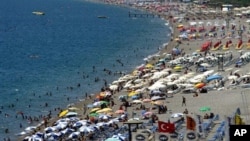Turkish Prime Minister Ahmet Davutoglu this week unveiled a financial package aimed at boosting the country's flagging tourism industry, including a 255 million lira ($87 million) grant and a facility to allow tourism firms to restructure debt.
Turkey's tourism — the lifeline of the country's fragile economy — is facing one of its most difficult years because of multiple security threats.
Turkey is especially popular with German tourists, but has seen bookings fall after a suicide bomber killed 12 Germans in Istanbul in January.
Meanwhile, Moscow has told Russians not to travel to Turkey after a Turkish fighter jet shot down a Russian warplane along the Turkish-Syrian border last October. And now, a Kurdish rebel group is warning tourists not to visit Turkey.
One of Europe's largest travel companies reports that bookings to Turkey are down 40 percent. Turkey's largest resort, Antalya, is popular with Russian tourists and has already been badly hit, according to Atilla Yesilada, an Istanbul-based consultant with Global Source Partners.
"A lot of companies are in serious difficulty,” Yesilada said. “Up to 1,300 hotels are up for sale. In Antalya, tourist arrivals by air are down by 21 percent. There is really a lot of hardship."
Diversification
Inan Demir, chief economist at Istanbul-based Finans Bank, says the tourist industry had already started to diversify away from dependence on Russian tourists.
"Turkey has already been getting used to living with reduced tourist numbers from Russia,” Demir said. “Since Russia went into its own financial crisis, its demand for Turkish holidays has been declining as well. So, Turkish companies have had some time to get adapted to these changes."
This diversification has involved a greater focus on oil-rich Middle Eastern countries; but, this is also problematic given plunging world oil prices, says consultant Yesilada.
"We've been receiving increasing numbers of tourists from Arab and other oil-producing countries, but their incomes are substantially down," Yesilada said. “More importantly, the subsidies by countries like Saudi Arabia to their citizens are down. That, I would say, would have a moderating impact on Turkish tourism, as well."
Growth, employment
Last week's suicide bombing of a military bus in Turkey's capital Ankara, which killed 28 people, is likely to add to Turkey's tourism woes. A group linked to the PKK, the Kurdish rebel group, claimed responsibility for the attack. That splinter group has carried out fatal bombings at tourist sites in Turkey in the past.
Yesilada says the economic effect of the problems facing the tourism industry could be considerable.
"Turkish tourism, which generates $35 billion, or 5 percent of GDP, could shave off one and half percent from growth," Yesilada said. “Another problem is that it's extremely labor intensive: It absorbs at least 2 to 3 million young people who would be otherwise unemployed. So if tourism goes down, employment would go down, and that would lead to social unrest."
The International Monetary Fund has already revised down Turkish economic growth for this year, and analysts warn that outlook could worsen with the growing threats and challenges the country faces.
Some information in this report was provided by Reuters.






